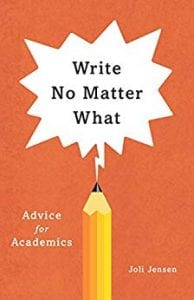(by Dr Anupratap Tomar, Research Associate, School of Physiology, Pharmacology & Neuroscience)
Academic writing is stressful and can be frustrating especially in todays’ ‘publish or perish’ environment. Scholars often multitask, i.e., they research, teach, interact with students, and perform other academic duties, all while vying to publish their work.
If you are an overwhelmed academic suffering from writing blues, then “write no matter what”, by Prof. Joli Jensen is a book for you. Jensen possesses over 30 years’ experience as a scholar and heads the faculty writing program at the University of Tulsa, United States.
This book deconstructs the psychology behind delays and procrastinations often ‘suffered’ by academics and provides useful practical solutions. While it demystifies the “how”, this book does not delve into “what” to write in scholarly publications.
The book is written in a conversational style using convincing and easy-to-follow language. The coherent arrangement of five sections into short (approx. 4-6 pages) well-structured chapters. The descriptive titles allow readers to identify specific sections/chapters in case they don’t intend to read the whole book.
Jensen has a knack for identifying toxic thought patterns that frequently mar academic writing and debunks the various myths underlying them. She emphasizes that we should avoid must-know-everything attitudes and advocates for acquiring a “craftsmen” approach i.e. learning and improving from every experience throughout life. Indeed, such advice can be applied to many other aspects of scholarly life.
A key message that I found compelling was about prioritizing projects using a front-burner/back-burner system. The suggestion is that when our main (front-burner) project is becoming overwhelming or we are stalled and frustrated, we should take a small break and collect material for our other (back-burner) project. This approach will likely ensure that we feel productive even while experiencing writer’s block.
In the last section, this book advises creating “faculty writing groups” where members find a supportive and motivating environment – which, according to Jensen, is lacking in current university setups. Such writing groups are a fantastic idea. Though Jensen clearly discourages egoistic attitudes, I am slightly sceptical that this will be a very successful forum at those universities where multiple faculty members may be vying for a few promotion spots.
There were a couple of typos, but they can be ignored since this book is a treasure trove of good advice. Overall, I found the book very useful and recommend that you grab a copy if you are stalled in your writing or seeking inspiration for productive writing under minimal stress.


